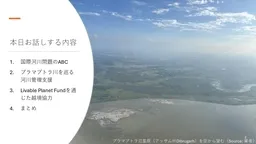

International Seminar on Brahmaputra River: Connecting Nations Through Water
International Seminar on Brahmaputra River: Connecting Nations Through Water
On May 29, 2025, a noteworthy online seminar titled "Connecting Nations through the River: Insights from the Brahmaputra River and International Organizations" was held, organized by the Japan Global Infrastructure Foundation (Japan GIF). The seminar featured prominent speaker Mr. Yukio Tanaka, a senior water resource management specialist at the World Bank based in Washington, D.C.
Purpose of the Seminar
In an era where skepticism towards international cooperation and relief organizations is growing, it's essential to shed light on the "invisible infrastructure"—the foundational efforts of international collaboration. The seminar delved into the ongoing large-scale projects in the Brahmaputra River basin, encompassing regions in India (Assam), Bhutan, and Bangladesh. Mr. Tanaka elaborated on the mechanisms through which transboundary water management contributes to peace and inclusive growth.
During the session, attendees gained insights into collaborative efforts on flood warning models, stakeholder interests balance between upstream and downstream regions, and aligning state and central government interests. The World Bank's role as a "neutral catalyst" in forming agreements among complex stakeholders was also discussed. Specific topics included the creation of data-sharing agreements, the design of funding incentives (such as the Revivable Planet Fund), and the cultivation of skills associated with technical cooperation—in efforts to prevent conflicts and build constructive relations between nations.
Overview of International River Issues
The session began with an overview of international river issues, indicating there are over 300 transboundary rivers worldwide, shared by more than 150 countries. These river basins cover nearly half of the Earth's land area and population, making the management of cross-border water resources crucial for international relations. Principles seen in Japan’s agricultural water rights, such as "upstream dominance" and "prior appropriation," also appear in the realm of international rivers but can be affected by national power dynamics. Although the UN Watercourses Convention was adopted in 1997 to promote cooperation and conflict resolution over international rivers, many upstream countries remain unratified.
Particularly in South Asia, international rivers hold significant diplomatic and security importance. India, as a regional dominant power, exerts considerable influence over rivers like the Ganges and through agreements like the Indus Water Treaty.
Key Features and Challenges of the Brahmaputra River
The Brahmaputra River originates from China and flows through India (Assam) and Bangladesh before emptying into the Bay of Bengal. In Assam, the river’s abundant flow causes significant damage due to flooding and bank erosion, affecting vital industries, including tea production.
The World Bank's Assam Integrated River Basin Management Program (AIRBMP) focuses primarily on the Brahmaputra's tributaries. The bank is collaborating with the Asian Development Bank (ADB), which is overseeing the main river's infrastructure improvements, while also seeking engagement from Bhutan and Bangladesh.
Regional and International Cooperation on the Brahmaputra River
From 2022 to 2024, various regional cooperation activities are set to occur, including reciprocal visits between Bhutan, India (Assam), and Bangladesh, alongside technical workshops on river morphology, flood forecasting, and inland waterway transportation. Investments from both government and development partners, such as India’s funding for hydrometeorological stations in Bhutan and river dredging projects in Bangladesh, highlight cross-border collaboration, though challenges regarding data access persist.
Current Status, Lessons Learned, and the Role of International Organizations
Looking forward, there is potential to utilize the Revivable Planet Fund (LPF) contributed by World Bank donor countries—including Japan—to implement projects under phase two of AIRBMP, anticipated to begin in January 2026. Agreement from both the Assam state government and India's central government has been secured for this initiative. While broad consensus has been reached with Bhutan and Bangladesh, the latter's ongoing political instability leaves future progress uncertain.
It's observed that discussing international river issues, particularly in South Asia, may often be considered taboo; however, when shared benefits exist for riparian states, collaboration can flourish. Enhancing inland waterway transport offers a unique opportunity for economic growth and decarbonization while reducing zero-sum competition between upstream and downstream nations.
The cooperative flood warning initiatives on the Brahmaputra serve as a rare case where a "downstream power" (India) requires hydrological information and an "upstream nation" (Bhutan) necessitates infrastructure development, yielding valuable insights transferrable to Ganges’ basin relations between India and Nepal.
To advance such regional cooperation, it is essential to establish not only the catalytic role of international organizations but also the necessary financial mechanisms for collaboration. Cooperation among riparian countries surrounding international rivers fosters reciprocal interdependence, ultimately serving as a means of conflict prevention between nations.
Q&A Session and Participant Interests
The seminar included a lively Q&A session, addressing topics like whether climate change poses a threat or an opportunity for cooperation, and discussions around interstate conflicts regarding water resources along the Euphrates River. Participants expressed high engagement regarding the cooperative efforts surrounding the Brahmaputra River, indicating a strong interest in the current status of regional projects and the critical role of international organizations.
Overall, this seminar illustrated the importance and complexities of international river management and highlights the vital role that collaboration plays in supporting peace and sustainable growth.




Topics Policy & Public Interest)










【About Using Articles】
You can freely use the title and article content by linking to the page where the article is posted.
※ Images cannot be used.
【About Links】
Links are free to use.